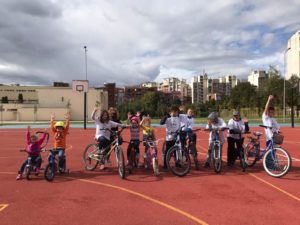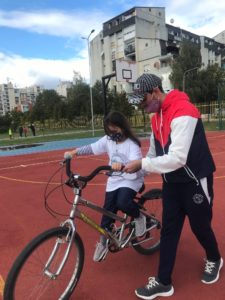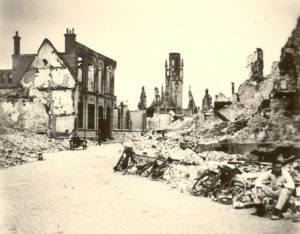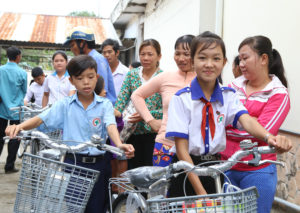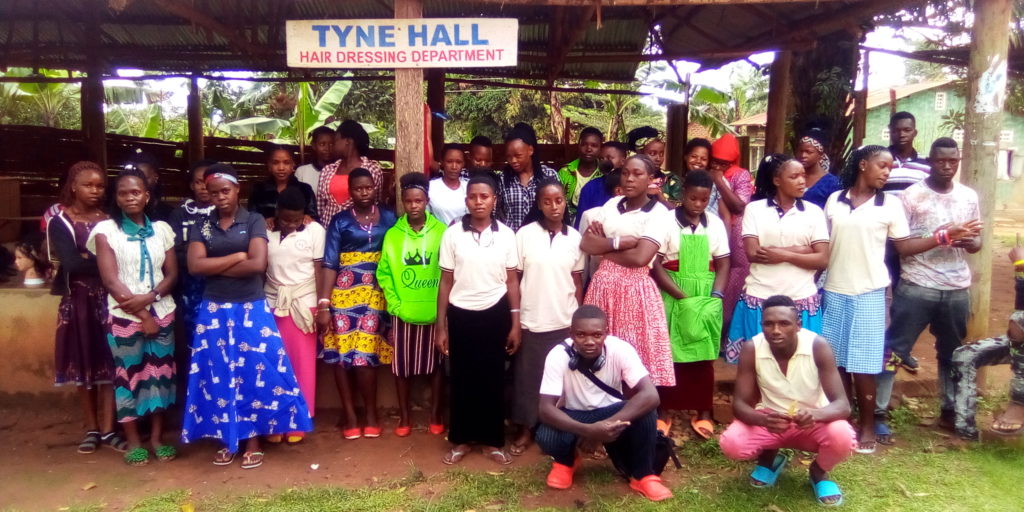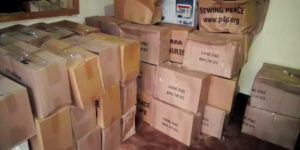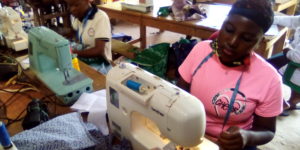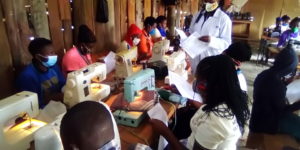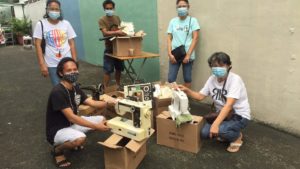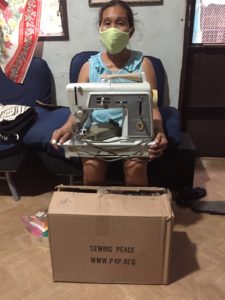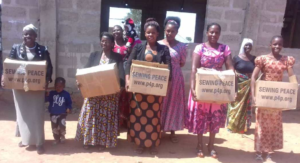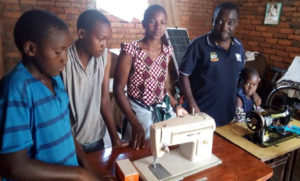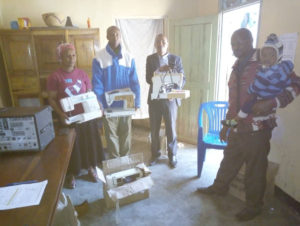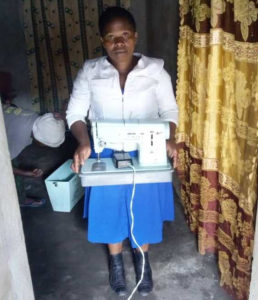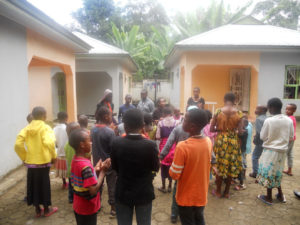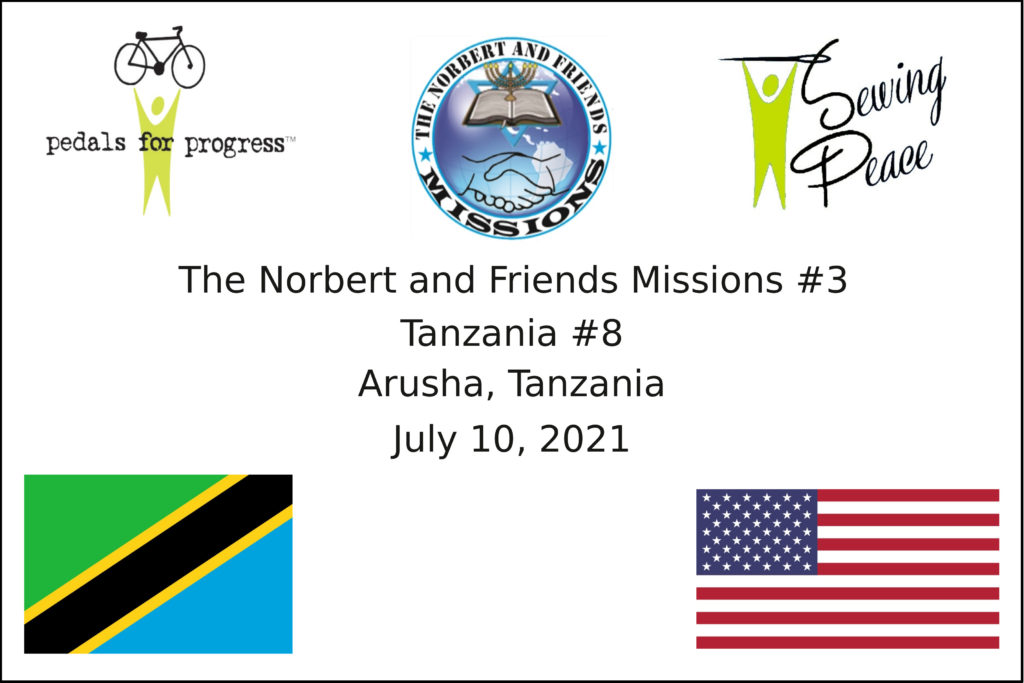By Clovert Mbenja
Summer 2021 Newsletter
Rising Hope Foundation for Change, in partnership with Sewing Peace, is implementing a program aimed at training vulnerable women and teenage girls in sewing, fashion, and design in Cameroon. This training program will empower these women with life skills such as tailoring, professional sewing, fashion and design, sewing machine repair, and basic computer knowledge. They will learn how to run tailoring businesses from their homes. Though women and girls at the entry point of the program may be unskilled, they will leave with a means to earn a livelihood, become trainers, and provide for their own families’ sewing needs. This program will promote and create female entrepreneurs and generate income. The program promotes economic self-reliance of women and girls in Cameroon and addresses the Sustainable Development Agenda 2030.
The zigzag sewing machines and other accessories sent by SP are very useful: they give a professional touch to the women who learn specialized sewing with different stitches. Some of the women have added new services because of the zigzag machine. At first, they had to travel long distances to use zigzag machines that are costly and unreliable. Now they can work at home or in our Centre.
We have also started a program to make and sell washable (and thus re-usable) sanitary pads to be used instead of the disposable ones. Thus we reduce the impact on the natural environment .
At the end of their training process, our trainees will be able to be either self-employed or hired as part of the team working on the washable sanitary pads.
This will have several benefits for the communities:
- skills development
- employment opportunities
- financial independence
- unemployment reduction
- poverty reduction
- better understanding of the menstrual cycle through the training for sanitary pad production
- better control of pregnancies
- better management of resources: options for education, potential for future earnings, and family planning
The Administration Entities in these regions will directly benefit from these programs, furthering their own objectives in terms of public health, social environment, and unemployment rates in the community, the region, and the country as a whole.
It will be a win-win situation for the Government, girls and women, and the community as a whole. Officially, Rising Hope Foundation for Change will launch the program in September 2021.
Success Stories
We gave some basic training to women who can sew but cannot afford a sewing machine. At the end of this 14-day training period, we gave them one sewing machine each. RHFC is excited and proud to bring these stories and thanks from the beneficiaries of the project.
Mami Blessing
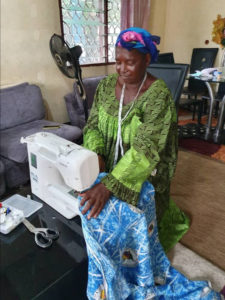 I am happy for this gift from Rising Hope Foundation of Change and its partner Sewing Peace. As a widow, I thought the world had forgotten about me. I was surprised when one of my mothers in church told me I was one of the lucky recipients of a sewing machine. I thought it was a joke until the coordinator himself called me to pick it up at the Centre. This machine is going to help me and my small family a lot. The 200 to 300 Francs we earn by patching dresses will help me buy breakfast for my children.
I am happy for this gift from Rising Hope Foundation of Change and its partner Sewing Peace. As a widow, I thought the world had forgotten about me. I was surprised when one of my mothers in church told me I was one of the lucky recipients of a sewing machine. I thought it was a joke until the coordinator himself called me to pick it up at the Centre. This machine is going to help me and my small family a lot. The 200 to 300 Francs we earn by patching dresses will help me buy breakfast for my children.
We all are going to improve our skills in sewing since the machine will keep us constantly working on small materials and children’s torn dresses. It is going to help me train my children in learning the art of sewing since we are not going to pay people to teach us again.
I pray that the lord almighty will bless Rising Hope Foundation for Change and their partner immensely.
Mangwi Ndi
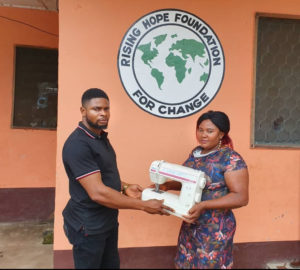 As an orphan who has spent more than 25 years in a remote village, I never knew people were so kind until I came to Limbe due to the ongoing Anglophone crisis. My boss introduced me to a matron of an orphanage who has a link with RHFC. That is how, after explaining my situation to the organization, I was lucky enough to get this sewing machine. Getting a machine from people I don’t know and haven’t heard of was a double miracle to me.
As an orphan who has spent more than 25 years in a remote village, I never knew people were so kind until I came to Limbe due to the ongoing Anglophone crisis. My boss introduced me to a matron of an orphanage who has a link with RHFC. That is how, after explaining my situation to the organization, I was lucky enough to get this sewing machine. Getting a machine from people I don’t know and haven’t heard of was a double miracle to me.
I am a seamstress by training but have been working for another person because I could not open a place of my own. This machine I just received will help me open my own shop and teach underprivileged girls and boys how to sew at a very low cost. Having this machine has given me full employment; it will help me earn money to build my future and take care of my needs like rent and family expenses. From my heart I pray the good Lord bless all the people supporting all the efforts of Rising Hope Foundation for Change.
Manka Synthia
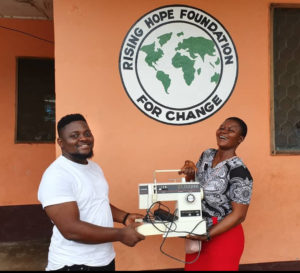 I am a single mother with 2 children. I was a farmer before the crisis started. When it became serious I had to stop going to the farm because of insecurity. I was advised by my landlady to learn a skill. She told me tailoring would be good because you can practice it until you are 70 years old. When going to do my hair at the Empowerment Centre of Rising Hope Foundation for Change, I overheard the members talking of the sewing machine program. I pleaded with them to put my name on the list in case they need single suffering mothers. To my great surprise I was called up for my special gift of a sewing machine. The machine will save me the money I was to pay for a new machine. It will help me learn fast since I will be learning at home and at the tailoring workshop. I think I will use the machine very well so that I can hand it down to my children when they grow. In the future I may also open a centre to train other single mothers like me.
I am a single mother with 2 children. I was a farmer before the crisis started. When it became serious I had to stop going to the farm because of insecurity. I was advised by my landlady to learn a skill. She told me tailoring would be good because you can practice it until you are 70 years old. When going to do my hair at the Empowerment Centre of Rising Hope Foundation for Change, I overheard the members talking of the sewing machine program. I pleaded with them to put my name on the list in case they need single suffering mothers. To my great surprise I was called up for my special gift of a sewing machine. The machine will save me the money I was to pay for a new machine. It will help me learn fast since I will be learning at home and at the tailoring workshop. I think I will use the machine very well so that I can hand it down to my children when they grow. In the future I may also open a centre to train other single mothers like me.

